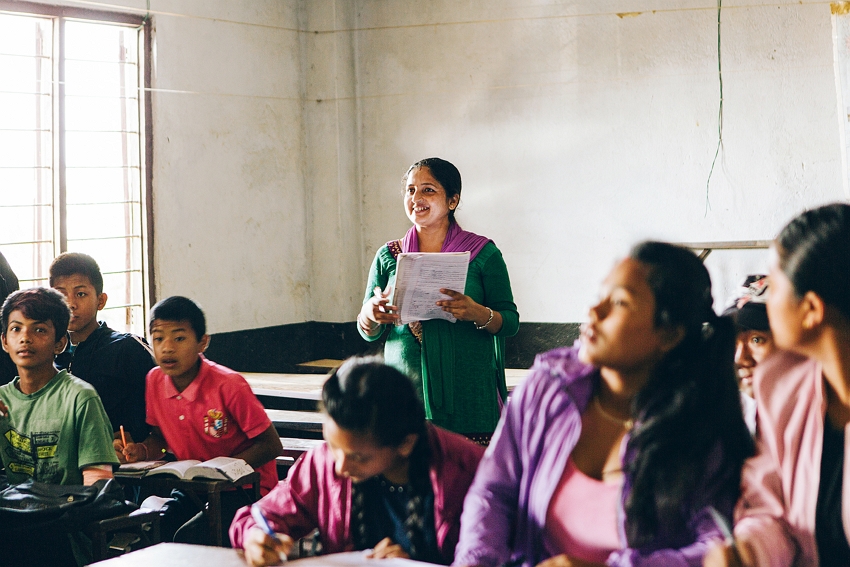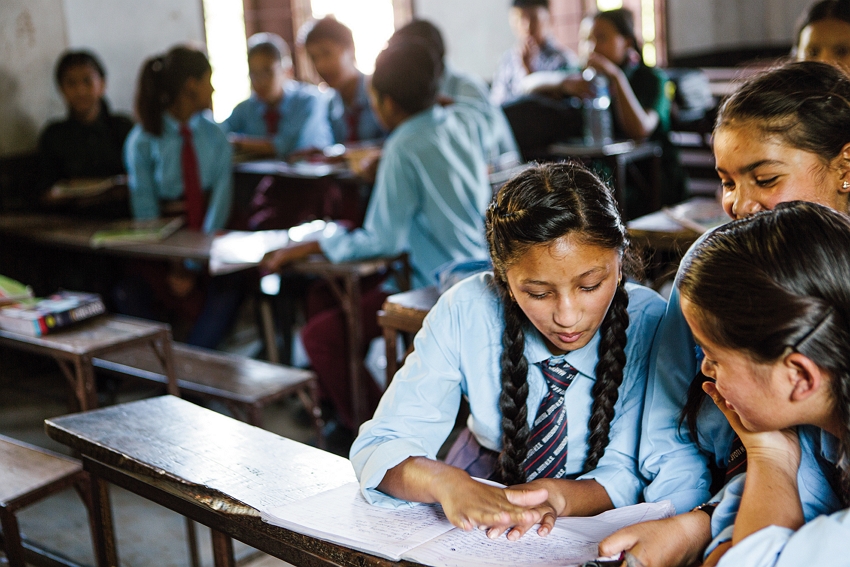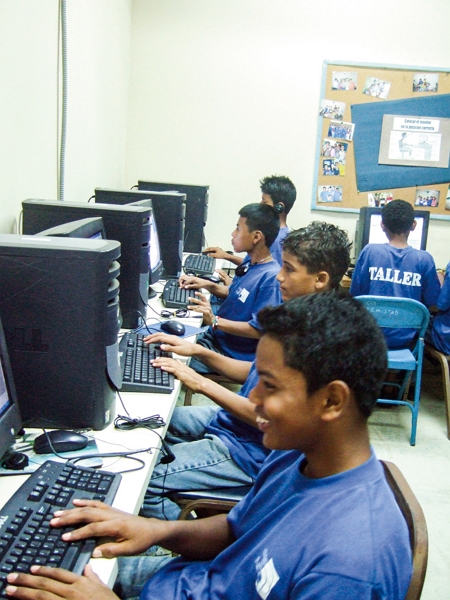New Southbound Policy Portal

(photo by Calls Over Ridges)
For the travel, for the experience, to broaden your horizons, or for whatever reason, you took a different kind of trip.
But once your dream of living somewhere else has been satisfied, the poverty caused by both natural and manmade disasters, and the lives so different from our own that you witnessed there, remain vivid in mind after you return home.
It is then that you become aware that short-term, one-off foreign service trips or assistance programs aren’t enough. How can one provide more effective, longer-term help? The answers to that question point to the future of overseas volunteer work.
The first time I heard someone mention “Calls over Ridges,” the poetic-sounding name made me think that it was a cultural foundation affiliated with a corporate conglomerate.
But as I learned more about the group, I discovered that this international NGO working on children’s education was staffed by people much younger than I had expected. The founders launched the organization just four years ago, while they were still at university, and the oldest staffer is only 25.
The reasons for creating the organization came from the founders’ experiences in overseas volunteer work.

Calls over Ridges team members Emily Tsai (left) and Sylvia Hung (right) have drawn on their own experiences as volunteers to upend the model for overseas service. (photo by Lin Min-hsuan)
To explore the world and to discover themselves, young people have long been boldly leaving the comfort of home for unfamiliar environs. Today, these trips remain as popular as ever.
In addition to study-abroad programs and working vacations, in recent years there has been a rise in volunteering for foreign service trips to destinations such as South Asia, Southeast Asia, and Central and South America. These sorts of trips have become quite popular.
Calls over Ridges has its roots in that trend. National Taiwan University economics majors Rikash Lin and Emily Tsai first bound their fates to Nepal as sophomores when they went there on a short-term service trip.
Like many who have participated in overseas service trips, they went abroad with an eagerness to try their best. At first, everything was new and fresh, but by the time they had begun to familiarize themselves with the environment, it was already time to leave. After leaving, they were left with a series of unresolved doubts and regrets.
“Many volunteers have deeply felt intentions about their service,” Tsai notes, whether they stem from a passion to save the world or a desire to experience something new. “But after the trip, no matter how much interaction they have had with local families, or no matter how well they have gotten along with local kids, they always end up receiving more than they give.”
Soon after they had made this realization, and just two months after they had returned from their trip to Nepal in February of 2015, in April the country was hit by a major earthquake of 7.8 magnitude. To provide disaster relief, they set out to establish a non-profit and made a public appeal for funding. Such was their unexpected path to establishing their organization.

Students from poor backgrounds often lack the time to complete their educations, dropping out to help support their families.
Calls over Ridges’ first base of operations was Gorkha in central Nepal, a once-flourishing place full of historical relics that has fallen into decline to become an isolated mountain city.
With contributions collected from 350 students, as well as five kilos of English books each, the founders returned to the public elementary school where they had once performed their service. “But when we opened the school’s storeroom, we discovered box upon box full of unused English books,” Tsai recalls. “It threw us for a loop.”
The school’s principal explained that he worried that the students would damage the books and that NGOs would decline to provide further resources if they found out.
At that point, the team began to realize that however much international organizations like the Red Cross and the United Nations excelled at providing speedy assistance in Gorkha at a time of particular need such as after an earthquake, they wouldn’t be able to resolve the deep-rooted causes of human poverty there.
Consequently, while the ultimate goals of Calls over Ridges aren’t far from those of most international NGOs—both hope to curtail intergenerational poverty through education—Calls over Ridges, aware of the insufficiencies in the traditional aid approaches, has adopted distinctly different operating methods.

Calls over Ridges has worked with a Nepalese elementary school, helping to reduce the dropout rate from 42% to 2%.
At the core of Calls over Ridges is a comprehensive and systematic model of educational service that includes the following: “educational fundraising,” to offer scholarships so that children can pursue education without financial anxieties; “building educational resources,” thus helping schools to create supportive environments; “encouraging parental participation,” by holding parent days and parent‡child seminars, which impress upon parents the importance of their children’s attendance at school; and “increasing motivation to learn,” by inviting successful people who moved from remote areas to work in the capital to come and give talks.
They also drew from their earlier experiences with foreign service, which taught them about the limitations of short-term stints: “If the decision to go abroad is just based on curiosity and a desire to see some different place, then it’s going be hard to get into the shoes of local people,” says Tsai bluntly. “That’s why volunteering is not the best recruitment mode for us.”
Maintaining that approach would only end up in emphasizing mutual dependency, which is certainly not a good thing for local communities.
“Calls over Ridges’ ultimate goal is to leave.” Tsai mentions that time and time again over the course of our interview.

The organization’s plan for planting the seeds of education takes a multifaceted approach. It has helped to increase schoolchildren’s motivation to study.
Consequently, the organization’s approach is to select a small number of local youths to put through higher education. After these young people graduate from college thanks to Calls over Ridges’ support, they will have foreign language skills and the ability to find resources, and can become key actors for turning around a locale.
A good example is Sang Doma Sherpa, one of the organization’s local partners in Gorkha. He started working for them as a volunteer interpreter. Later, after working on various projects at different times, he became a communication portal between the organization and schools. With his skills being cultivated step by step, he became familiar with the organization’s operating methods.
Today, as the local outfit has taken on the spirit of the Taiwan group, Sang Doma has registered the Nepal branch of Calls over Ridges with the Nepalese government as a local NGO. The methods and structures have been extended from Taiwan, but the personnel and resources are now all local.

The exotic scenery of distant lands is another factor attracting volunteers to foreign service. (courtesy of Jane Chiang)
They are dressed up with buzzwords like “philanthropy” and “service,” but how much do international service trips actually help?
Undeniably, just like 150 years ago, when the missionary George Leslie Mackay came to Taiwan from distant Canada, sparking an enlightenment in Taiwan’s medical services, the cross-cultural stimulation sparked by volunteers from abroad can be key to local transformation.
Sean Chu, the founder of the non-profit Waker, which sends about 1000 volunteers overseas every year, shares what he sees as the proper approach for volunteers going abroad: “Volunteers are a bridge and a catalyst for building communities. They don’t play leading roles, which ought to belong to the people of the community.”

The computer classroom in Panama’s City of the Child shelter is where Jane Chiang used to teach. (courtesy of Jane Chiang)
Starting in 2008, Jane Chiang served as a volunteer for 14 months at Panama’s the City of the Child, a shelter for children. She has also undertaken short-term service stints in Taiwan. She describes two very different working models depending on length of stay. In terms of both personal experiences and benefit to the local community, the situations are “very different,” she says.
Since returning from her long period of service in Panama, despite the distance Chiang has cleared ten to 14 days every year or two to return. Like a migrating bird, these travels have become just a normal part of her life: “It’s just like going home to see my family.”
She has a degree in information management, and at City of the Child she taught computing. She only makes short trips now, so she is no longer assigned duties, but since she is still familiar with its systems, she always finds herself “patrolling the fields”—returning to the office and the computer classroom and helping with maintaining systems: “It’s like when you go home and Mom says there’s something wrong with the computer and wants your help.”

By teaching overseas, volunteers can cultivate a love of learning in their foreign charges.
Although the founders established the organization with only short-term volunteer experience, to ensure continuity and that knowledge is passed down locally, Calls over Ridges now no longer recruits international service volunteers to go to Nepal.
The only exceptions are when special projects or plans create a clear, large-scale demand for personnel—much like when they worked with Professor Lin Ming-jen back in the day. Lin mobilized 90 student volunteers to go to Gorkha, and he leveraged their service there as the basis for research into developmental economics. The college students accompanied each of the children to their homes to understand their family situations, so as to better make sense of structural issues beyond the classroom. With these research results, the organization developed the four main orientations of their plan for sustainable local educational development.
Calls over Ridges eschews making big shows of “bringing love to distant places.” Instead, it retreats behind the scenes, giving the spotlight to locals. “After all,” says Tsai, “this organization was established to meet local needs.”
Sparing no effort at communicating with communities and being there for them, as well as planning their own withdrawal, Calls over Ridges are as sincere in their aims today as when they were first volunteers: They are extending a helping hand wherever there is need, beyond international borders and with no ulterior motive. “We want to transfer our impact and influence to locals,” they say with determination.